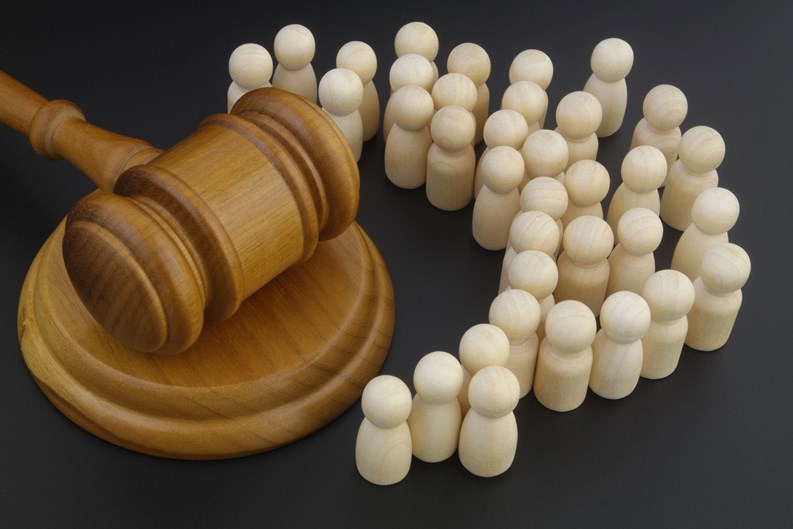Americans are a particularly litigious lot, believing as many of us do that we are endowed with the inalienable right to life, liberty…and the pursuit of recompense for any slight or wrong done to us, real or perceived. This tendency is unfortunately common in the nation’s condos, co-ops, and HOAs, where the ideals of communal living and shared ownership sometimes get overshadowed by grievance and strife.
It’s no wonder, really; these are complicated properties containing multiple households with shared walls, common spaces, and governance—including an established set of rules, regulations, and covenants that are often selectively followed, unevenly enforced, or both. An array of entities contribute to their operation and upkeep, including managing agents, service providers, contractors, insurers, utilities, real estate brokerages, and miscellaneous vendors to name just a few, all overseen by a volunteer board—and all with a potential axe to grind. Above all, these are people’s homes, and often their largest investment, making for an especially edgy environment.
Emotions Run High in a High-Rise
Attorney David Hartwell, with the law firm of Keough & Moody in Chicago, has seen the personal toll that lawsuits can have on a community. “There are a lot of emotions surrounding lawsuits,” he says, “especially when a resident names individual board members instead of just suing the association as a whole.” Associations and co-op corporations are not nameless, faceless entities like other businesses that might find themselves on the wrong side of a subpoena. When a resident sues the board, notes Hartwell, they are bringing a legal action against their neighbors—neighbors who have volunteered their time and energy to govern the community.
“If there is litigation between a resident and the board,” says Alison Phillips, vice president of multifamily and commercial for property management company FirstService Residential New England, “that makes things very uncomfortable and awkward for all involved. Ongoing litigation can be very taxing on all parties, and can have a multitude of negative impacts. I would say one of the biggest negative impacts is board burnout and resignation. Finding candidates for board seats can be very difficult in many communities, so it can be very detrimental if board members resign.”
“All of this makes for some difficult logistics,” adds Andrew Freedland, an attorney with Herrick, Feinstein in New York City. “If you have a shareholder suing the co-op,” he continues, “it goes without saying that depending on what the suit is, large or small, you may not be able to release any details at an annual meeting. Other shareholders may be very curious, because they are ultimately responsible if there is a judgment against the co-op, which could result in an assessment.”
This brings up two important issues surrounding any community’s legal imbroglios: who knows, and who pays. In fact, questions about transparency and liability are the two that appear most frequently in New England Condominium reader emails, online comments, and social media channels. If you are wondering why your board won’t share details about ongoing litigation with the other owners or shareholders, or if you expect that you won’t be financially responsible for someone else’s lawsuit, read on.
Condo Confidential
In most jurisdictions, even where owners/shareholders have statutory rights to access specific information and documentation about their community, litigation is one area where certain details and discussions must be kept confidential. As soon as even a suggestion of litigation arises, boards should proceed with extreme circumspection.
Hartwell is firm on the subject. “Board members should not discuss a lawsuit with other unit owners,” he states. “They shouldn’t attempt to try a lawsuit by public opinion within the community.”
“Don’t discuss the case,” echoes Mark Hakim, attorney with New York City law firm Schwartz Sladkus Reich Greenberg Atlas LLP. “Don’t admit anything. If you run into the complainant in the elevator, say ‘Hi’ and get out of the elevator. There is no good to having a discussion, whether on or off the record. The last thing you want to do is prejudice the case by saying the wrong thing with the right intent.”
That said, attorney David Berkey of New York City-based law firm Gallet Dreyer Berkey, LLP notes that “A co-op or condominium is usually required to list pending lawsuits in its financial statements if they might materially affect the finances of the organization,” and adds that most judgments become public record, allowing anyone to find case information if and when it reaches that stage.
Meanwhile, says Scott Piekarsky, a partner in the litigation and real estate departments of the Hackensack, New Jersey office of law firm Phillips Nizer LLP, “Don’t discuss the case with anyone, and don’t ignore it. Even if a board member is a lawyer, leave it to your [condo, HOA, or co-op’s] counsel. Anything you say can be used against you in ensuing litigation. Get professional help. Don’t try to confront the person and try to intimidate them. Go through normal channels. That’s why they exist.”
So Sue Me
The ‘normal channels,’ according to pros, are to immediately notify both the corporation’s or association’s legal counsel and its insurance provider. In the case of the latter, coverage may depend on timely and proper notification.
“A lawsuit starts even before the complaint has been served,” says Chris Florio, an attorney with Stark & Stark in Lawrenceville, New Jersey. “When you look at insurance policies—which are contracts—we learned a long time ago that if there’s the potential for a suit, you need to give written notice to the insurance broker of that potential. Policies contain language that state if you don’t give adequate notice for a suit, the carrier may issue a declination of the claim.”
Coverage also depends on what type of suit is being brought, and by whom. If a resident or contractor is suing the board, for example, the legal defense is normally covered by a Directors & Officers (D&O) policy that the building or community should maintain under its insurance plan. Other claims against the corporation or association as a whole—a slip-and-fall, construction defects, and so forth—would likely be covered under its general liability policy. Some governing docs contain provisions that indemnify the board for actions taken in good faith. This indemnification can be over and above any available D&O liability insurance.
Either way, notification of impending litigation or submission of a claim does not risk premium escalations, say the experts. What does affect the premium is historic litigation and other risk factors that might be present in a building or community (e.g., its age, size, location, or amenities such as a pool or a gym). That is, if a co-op, condo, or HOA has been sued a lot—or if a carrier deems lawsuits likely given certain factors—that co-op, condo, or HOA should maintain a more robust policy to protect it adequately, and should expect higher premiums. Ultimately, those premium costs are borne by the shareholders or unit owners in their monthly carrying charges.
Some proprietary leases and condominium/association bylaws award attorneys’ fees to the prevailing party called upon to defend a lawsuit filed by a tenant-shareholder or unit owner against a board. “Owners are often surprised when they get the bill for [the building or community’s] legal costs when they threaten to sue,” says one manager who prefers to remain anonymous. “But so many disputes arise from unawareness of the bylaws in the first place. What they should really understand is that by suing their building, they’re basically suing themselves and their fellow owners.”
When there is a damages judgment against the condo, co-op, or HOA, or if the parties choose to settle, the insurer might pay in some circumstances—at least up to limits set in the policy. Of course, this all depends on dotting all the i’s and crossing all the t’s in the first place, and does not apply to acts of fraud, negligence, or decisions made in bad faith. But when there is no coverage, or if the damages exceed policy limits, those costs fall on the shareholders or unit owners as a maintenance increase or special assessment, depending on how the board chooses to allocate its financial resources.
I Won’t See You in Court
Because of the time and expense involved in litigation—not to mention the toll it takes on everybody involved—it’s almost always preferable to at least attempt to defuse potential litigation before it gets to the court stage through alternative dispute resolution, or ADR. In ADR, the parties at odds work with a neutral third to reach a mutually agreed upon resolution of the dispute. This can be accomplished through either mediation or arbitration.
While sometimes those terms are used interchangeably, they’re actually two different processes. According to the American Arbitration Association (AAA), “Arbitration is the submission of a dispute to one or more impartial persons (known as ‘neutrals’) for a final and binding decision, known as an ‘award.’ Awards are made in writing and are generally final and binding on the parties in the case. Mediation, on the other hand, is a process in which an impartial third party facilitates communication and negotiation and promotes voluntary decision-making by the parties to the dispute.”
“Not all lawsuits are created equal,” explains Phillips. “Ones that cannot be resolved in mediation and end up in court tend to be more damaging, as they are often drawn out for longer periods of time and usually result in a win/loss outcome. Mediation typically has a win-win outcome that both parties can live with.”
Some jurisdictions, such as New Jersey, mandate the use of ADR before a housing-related case can be adjudicated in a court of law. Others, like Illinois, specify that “[t]he declaration or bylaws of a condominium association may require mediation or arbitration of disputes in which the matter in controversy has either no specific monetary value or a value of $10,000 or less, other than the levying and collection of assessments, or that arises out of violations of the declaration, bylaws, or rules and regulations of the condominium association,” per the state’s Condominium Act.
The Court of Public Opinion
Regardless of the outcome of litigation or the path a particular complaint takes, frequent lawsuits are not a good look for any community. Prospective purchasers, or their representative brokers and/or attorneys, normally look for evidence of past, ongoing, or potential for litigation as part of their due diligence review. As such, says Berkey, “The broker community becomes aware of buildings that are often sued, or that have judgments against them. In such cases, potential purchasers usually will stay away from a building if there is a comparable alternative place to live that is litigation- or judgment-free.”
Additionally, “Many lender questionnaires do ask if the condo association is part of any litigation, and those who are need to disclose that information. Depending on the status of the lawsuit, buyers may have a difficult time purchasing at that community,” warns Phillips. “Equally, if a buyer has a hard time finding funding for a unit at a specific community, then the seller will not be able to easily sell their unit.”
On a more qualitative level, frequent lawsuits can also lead to a less trusting and less harmonious community. Not only will it beg the question of why there are so many lawsuits (Is the board incompetent or unfair? Are the residents hot-tempered, litigious jerks?), but the fine line that the board must tow between transparency and discretion in these matters can cause rumors, suspicion, and hostility to brew.
No matter the process, perception, or outcome, lawsuits are always a headache for all parties involved. Even the lawyers who make their living trying these cases suggest that disputes be resolved by means other than litigation.
As they say, a lean compromise is better than a fat lawsuit.
Darcey Gerstein is Associate Editor and a Staff Writer for New England Condominium.










Leave a Comment